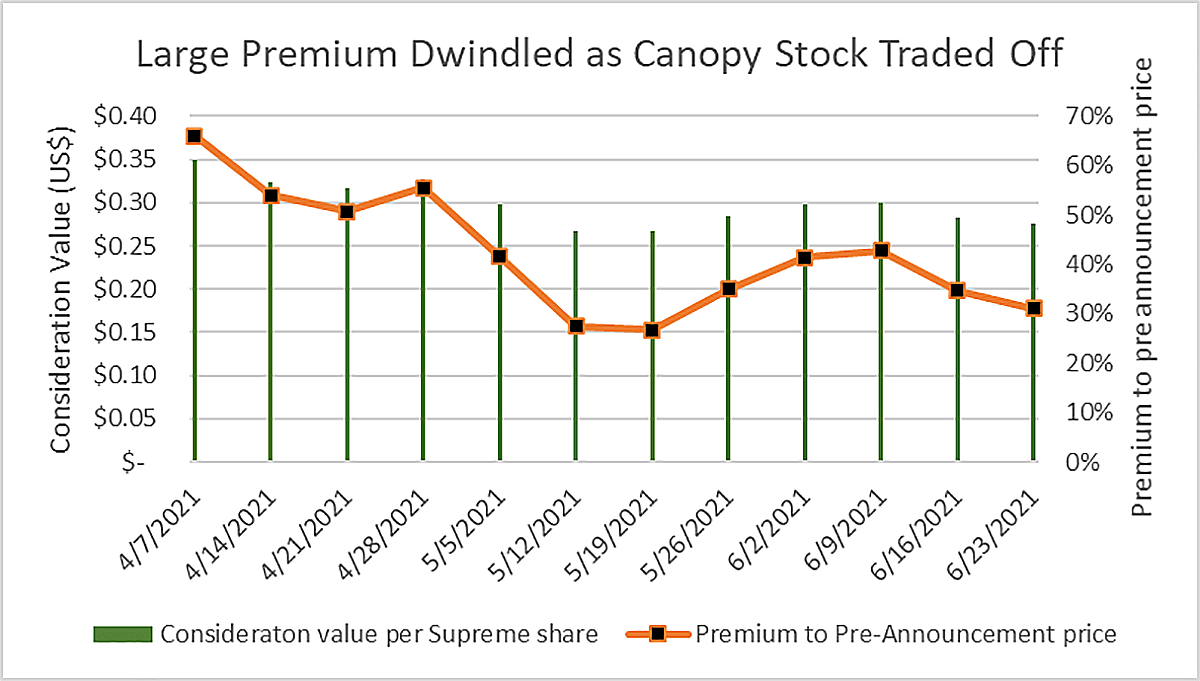Health Canada says it was not aware a member of cannabis producer CannTrust’s board was under investigation by securities regulators and police when the federal regulatory agency reinstated the licenses for two of the company’s production sites in 2020 after an illicit cultivation scandal.
The executive, Mark Litwin, was one of three former CannTrust officials charged with “quasi-criminal” offenses in late June after a nearly two-year joint investigation by the Ontario Securities Commission (OSC) and Royal Canadian Mounted Police (RCMP).
Health Canada noted that such an investigation “is distinct from any actions” taken by the regulatory agency.
“The department is responsible for administration of rules and standards that apply to the production, distribution, sale, importation and exportation of cannabis by federal license holders,” a spokesperson noted in an emailed statement to MJBizDaily.
Litwin, whose charges include fraud and insider trading, resigned from the board earlier this year.
The other two executives – Peter Aceto, the company’s CEO at the time of the alleged incidents, and Eric Paul, a former CannTrust chair – resigned long before the licenses were reinstated.
The slew of charges could come with jail time and a fine of not more than 5 million Canadian dollars ($4 million) upon conviction.
Lawyers for the three men say their clients are innocent.
Scott Fenton, representing Litwin on behalf of Toronto-based Fenton, Smith Barristers, previously told MJBizDaily his client “did not commit any offences, nor was he aware of others who may have committed any offences. Mr. Litwin intends to vigorously dispute the charges that have been made against.”
The Health Canada spokesperson said the regulator reviewed all information submitted by CannTrust “and was satisfied that it addressed all issues that led to the suspension of its licenses and reinstated their licenses.”
Health Canada suspended CannTrust’s licenses on Sept. 17, 2019, after a whistleblower alerted the regulatory body earlier that summer to potential illegal cultivation.
Health Canada reinstated the licenses in May 2020 and August 2020, respectively.
Health Canada unaware
In the emailed statement, Health Canada said it was not aware that Litwin was under investigation by police and securities regulators during the suspension and subsequent reinstatement of the CannTrust licenses in 2020.
The statement said Health Canada took “significant compliance and enforcement actions,” including:
- Unannounced inspections.
- Seizure and detention of product.
- Suspension of its licenses to sell cannabis.
Health Canada also said CannTrust undertook actions on its own initiative to address the areas of noncompliance, including voluntarily stopping sales.
“It is important to note that any criminal investigation and action taken by the Ontario Securities Commission and RCMP is distinct from any actions by Health Canada,” the Health Canada spokesperson said.
Health Canada’s reinstatement of the CannTrust licenses attracted scrutiny because the company did not face a fine, leading some industry sources to question whether the producer got off too easily.
Potential penalties for violating the Cannabis Act and its regulations include an administrative monetary penalty of up to CA$1 million.
“It brings to the forefront again questions about what Health Canada’s process was in determining what, if any, consequences CannTrust and its principals were going to face as a result of intentional noncompliant activity,” said Trina Fraser, a partner at Brazeau Seller Law in Ottawa, Ontario.
“Obviously, we’re dealing with two completely separate and independent bodies, and clearly one has been more aggressive on compliance than the other.”
‘Own mandates’
Sherry Boodram, CEO and co-founder of Toronto-based regulatory consulting firm CannDelta, said she wasn’t surprised the Health Canada probe into CannTrust and the OSC/RCMP probe yielded such different outcomes.
She said Health Canada has not often suspended or revoked licenses, so the regulator considers those to be serious actions.
“Although Health Canada and law enforcement work closely together on many aspects, they still each have their own mandates to follow and jurisdiction for authority,” Boodram said.
Boodram was a Health Canada cannabis inspector before founding CannDelta.
“Health Canada will look at the scenario from a regulatory perspective and use the tools available to them through legislation and policy – such as suspensions and potential reinstatements – if the proposed corrective actions have been found to be satisfactory,” she said.
“Any criminal aspects, including investigations, falls outside Health Canada’s authority and into the realm of law enforcement. So, we may in fact see two different outcomes between Health Canada and law enforcement.”
“There likely was the appropriate level of communication between the two authorities, which can be limited when there is an active investigation. There may have be limited information disclosed to Health Canada until a charge is laid to avoid compromising an investigation.”
Matt Lamers is MJBizDaily’s international editor, based near Toronto. He can be reached at matt.lamers@mjbizdaily.com.





